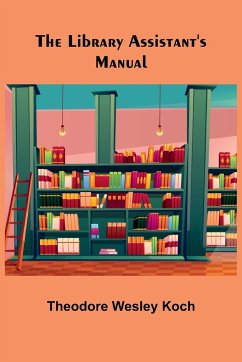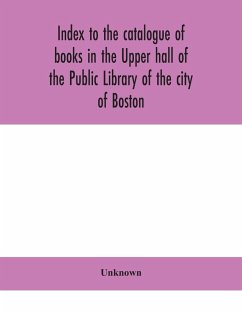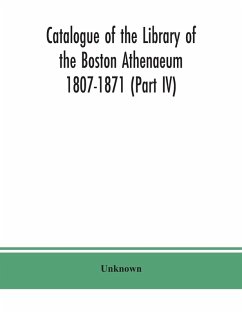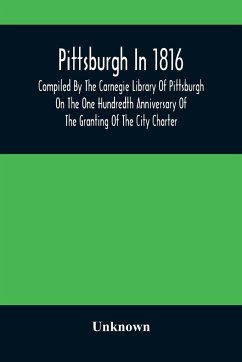John Henry Quinn
Broschiertes Buch
Manual of Library Cataloguing
Versandfertig in 1-2 Wochen
Weitere Ausgaben:

PAYBACK Punkte
10 °P sammeln!




Manual of Library Cataloguing has been regarded as significant work throughout human history, and in order to ensure that this work is never lost, we have taken steps to ensure its preservation by republishing this book in a contemporary format for both current and future generations. This entire book has been retyped, redesigned, and reformatted. Since these books are not made from scanned copies, the text is readable and clear.
John Henry Quinn, an eminent figure in the field of library science, has garnered recognition for his substantial contribution to librarianship and bibliographic standards through his seminal work, 'Manual of Library Cataloguing'. With meticulous research and authoritative guidance, Quinn's manual has become an indispensable resource for librarians, archivists, and information professionals seeking comprehensive knowledge on cataloguing practices. His writing stands out for its clarity of thought, precision in detail, and the pragmatic approach to the complex and evolving landscape of catalogs and metadata standards. Reflecting the breadth of his expertise, the 'Manual of Library Cataloguing' serves both as a foundational text for students in library science programs and as a practical guide for seasoned practitioners needing to navigate the intricate systems of modern-day information retrieval. Quinn's literary style is noted for its didactic tone, which is balanced by a readily accessible manner that demystifies the intricacies of cataloguing, making it less daunting for novices. The pedagogical bent of his work ensures it is not just theoretical but also of tangible value to those engaged in the organization of knowledge. While much of Quinn's professional life and academic background remain shrouded, his contributions to library science literature speak volumes of his authority in the field.
Produktbeschreibung
- Verlag: Alpha Editions
- Seitenzahl: 196
- Erscheinungstermin: 4. Dezember 2022
- Englisch
- Abmessung: 229mm x 152mm x 11mm
- Gewicht: 293g
- ISBN-13: 9789356787766
- ISBN-10: 935678776X
- Artikelnr.: 66997099
Herstellerkennzeichnung
Libri GmbH
Europaallee 1
36244 Bad Hersfeld
gpsr@libri.de
Für dieses Produkt wurde noch keine Bewertung abgegeben. Wir würden uns sehr freuen, wenn du die erste Bewertung schreibst!
Eine Bewertung schreiben
Eine Bewertung schreiben
Andere Kunden interessierten sich für














